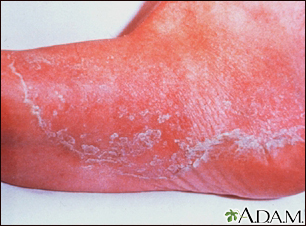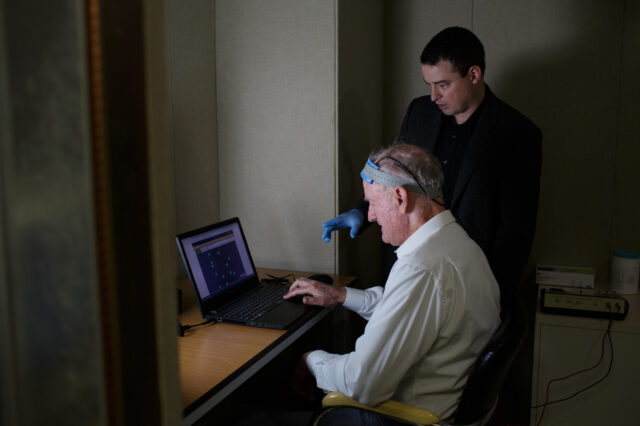- Investigator
- Salvatore T Scali
- Status
- Accepting Candidates
Scales
Definition
Scales are a visible peeling or flaking of outer skin layers. These layers are called the stratum corneum.
Alternative Names
Skin flaking; Scaly skin; Papulosquamous disorders; Ichthyosis
Causes
Scales may be caused by dry skin, certain inflammatory skin conditions, or infections.
Examples of disorders that can cause scales include:
- Eczema
- Fungal infections such as ringworm, tinea versicolor
- Psoriasis
- Seborrheic dermatitis
- Pityriasis rosea
- Discoid lupus erythematosus, an autoimmune disorder
- Genetic skin disorders called ichthyoses
Home Care
If your health care provider diagnoses you with dry skin, you'll likely be recommended the following self-care measures:
- Moisturize your skin with an ointment, cream, or lotion 2 to 3 times a day, or as often as needed.
- Moisturizers help lock in moisture, so they work best on damp skin. After you bathe, pat skin dry then apply your moisturizer.
- Bathe only once a day. Take short, warm baths or showers. Limit your time to 5 to 10 minutes. Avoid taking hot baths or showers.
- Instead of regular soap, try using gentle skin cleansers or soap with added moisturizers.
- Avoid scrubbing your skin.
- Drink plenty of water.
- Try over-the-counter cortisone creams or lotions if your skin is inflamed.
If your provider diagnoses you with a skin disorder, such as an inflammatory or fungal disease, follow instructions on home care. This may include using a medicine on your skin. You may also need to take a medicine by mouth.
When to Contact a Medical Professional
Call your provider if your skin symptoms continue and self-care measures aren't helping.
What to Expect at Your Office Visit
The provider will perform a physical exam to look closely at your skin. You may be asked questions such as when the scaling began, what other symptoms you have, and any self-care you've done at home.
You may need blood tests to check for other conditions.
Treatment depends on the cause of your skin problem. You may need to apply medicine to the skin, or take medicine by mouth.
Gallery




References
Dinulos JGH. Psoriasis and other papulosquamous diseases. In: Dinulos JGH, ed. Habif's Clinical Dermatology. 7th ed. Philadelphia, PA: Elsevier; 2021:chap 8.
Marks JG, Miller JJ. Scaling papules, plaques, and patches. In: Marks JG, Miller JJ, eds. Lookingbill and Marks' Principles of Dermatology. 6th ed. Philadelphia, PA: Elsevier; 2019:chap 9.
Related specialties
Clinical Trials: Scales
UF Health research scientists make medicine better every day. They discover new ways to help people by running clinical trials. When you join a clinical trial, you can get advanced medical care. Sometimes years before it's available everywhere. You can also help make medicine better for everyone else. If you'd like to learn more about clinical trials, visit our clinical trials page. Or click one of the links below:
- Investigator
- Salvatore T Scali
- Status
- Accepting Candidates
News and Patient Stories: Scales
Brain stimulation treatment may improve depression, anxiety in older adults
April 10, 2024
GAINESVILLE, Fla. — A noninvasive brain stimulation treatment improved depression and anxiety symptoms among older adults in a new University of Florida…
College of Public Health and Health Professions, +1 more

UF neuroscientist uses AI to map learning, decision-making, to discover how brains work
February 22, 2024
With trial and error, repetition and praise, when a puppy hears “Sit!” they learn what they’re expected to do. That’s reinforcement learning, and it’s a…
AI at UF, The Herbert Wertheim UF Scripps Institute for Biomedical Innovation & Technology, UF Health, +1 more

Latest podcast episodes
For long-term weight loss, embrace the bathroom scale
The scale can be a powerful motivator for weight loss — and not just for the number it shows. Researchers have found that women who make stepping on the scale a part of their daily routine are less...
Hair weaves in African Americans cause scalp issues
It’s been said there’s a price to pay in order to stay fashionable, but some might question the cost if there’s a health consequence. While the practice is in fact an ancient one dating back to the...
More troops tipping the scales
A U-S Department of Defense study shows more troops are struggling to win...